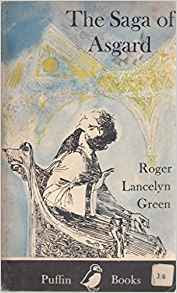Poul Anderson, The Fleet Of Stars, 4.
"...the cosmos of an ancient mythology - Yggdrasil, with roots in earth, in winterland, and in hell, with trunk soaring up to heaven, and nine worlds strewn through the windy, shadowy leafage of its crown - Yggdrasil, the All-Tree, whose fall shall bring the doom of the gods and the end of time...." (p. 49)
Retellings of myths change them, unless the retelling is scholarly and academic. In the Eddas:
the Tree survived the Ragnarok;
the surviving human couple hid among its branches;
the old gods died but their children survived into a new heaven and earth.

5 comments:
Kaor, Paul!
I have seen suggestions that the apocalyptic sections of the ELDER EDDA took form at least partly under Christian influence. One thinks of the Book of the Apocalypse, and the imagery found there about the new heaven, Earth, and Jerusalem
Sean
Sean,
Also, when Vidar (?) avenges Odin by tearing Fenris Wolf apart, an earlier version of the myth might have had Odin coming back out biut, in the received version, it is important that the old gods die.
Paul.
Kaor, Paul!
Some Scandinavian myths do have Odin hanging himself to obtain wisdom, and then somehow coming back. Or sacrificing an eye to obtain knowledge. And Poul Anderson even included a hint of that when he had his character Eodan wryly saying, near the end of THE GOLDEN SLAVE, that he had sacrificed an eye for wisdom.
Btw, have you ever read any translation of the ELDER EDDA? I've read Lee Hollander's version, THE POETIC EDDA.
Sean
Sean,
I have read some of it on line.
Paul.
Kaor, Paul!
And Hollander's translation of the EDDA is one of the too many books I should reread!
Sean
Post a Comment